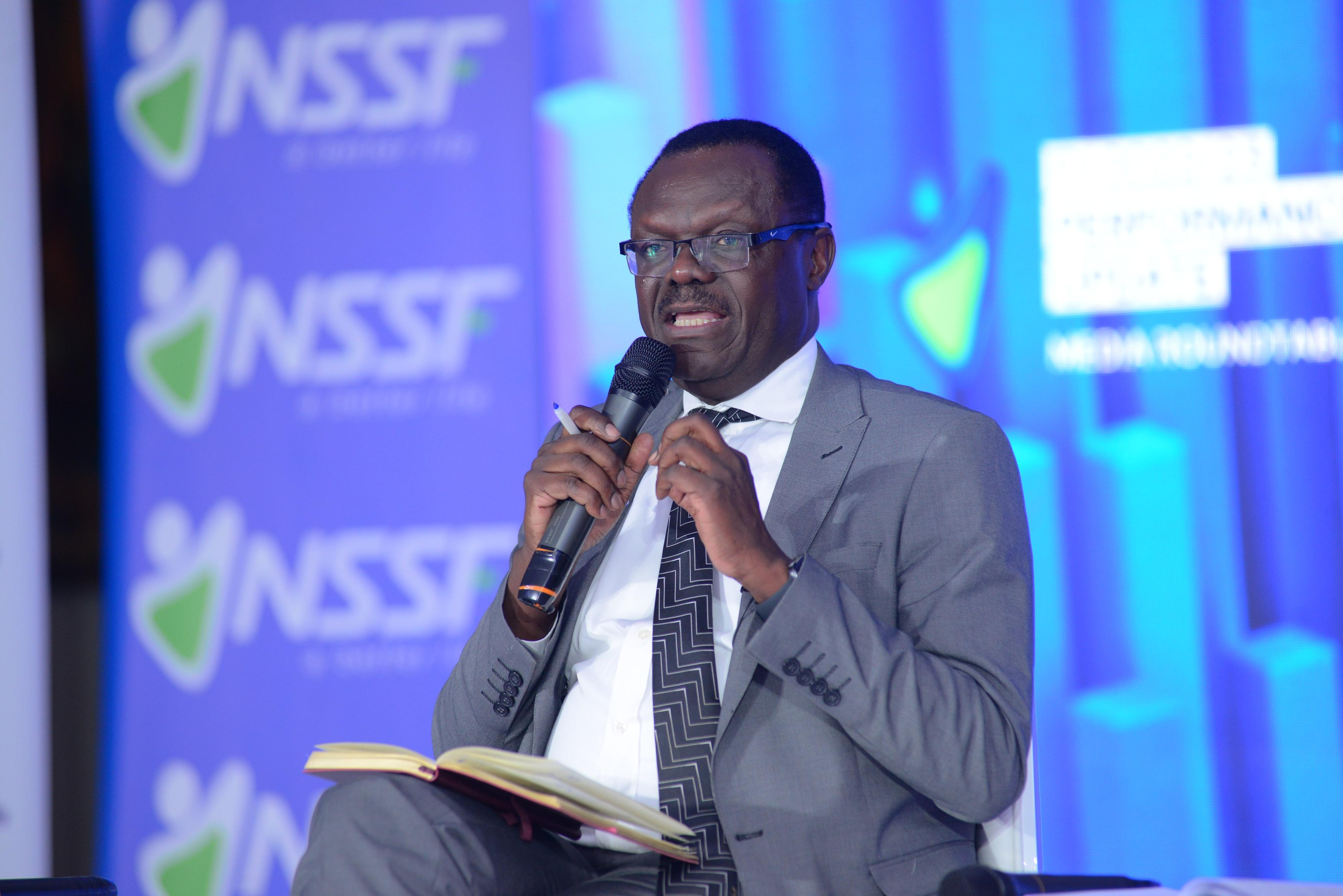NSSF board has its work cut out

NSSF management address journalists at the Kampala Serena Hotel during a media breakfast meeting in September 2024. PHOTO/STEPHEN OTAGE
What you need to know:
- NSSF members continue to push for an increment in the interest paid on the pool of savings that increased 19.2 percent compared to the previous year to reach Shs22.13 trillion.
As the new David Ogong-led National Social Security Fund (NSSF) board continues to find its feet, experts say it has its work cut out with the provident fund still smarting from a string of maladministration allegations. NSSF will on Thursday hold its 12th Annual Members’ Meeting in which it is widely expected to announce a double-digit interest rate for the Financial Year (FY) 2023/24.
At a recent event in which the composition of the new NSSF board was announced, Labour minister Betty Amongi tasked it to adhere to corporate governance’s best practices. She also tasked the board to grow the Fund to at least Shs50 trillion. This is as NSSF members continue to push for an increment in the interest paid on the pool of savings that increased 19.2 percent compared to the previous year to reach Shs22.13 trillion.
Good returns
With the size of the Fund increasing, savers are angling for good returns. They are buoyed by the fact that the Funds’ financial results released in Kampala this past week show that earnings increased to Shs2.53 trillion from Shs2.2 trillion. The revenue growth reflects positive returns on both dividend and capital gain on equity investments spread across the region, especially in Kenya, Tanzania, Uganda and Rwanda securities exchange counters.
In the regional debt market, the Fund managers say it has been stable with market participants reporting that long-term bond yields in the three major East African economies increased compared to last FY.
The Fund also saw a better year across other key performance indicators, including growth in assets under management, contributions collected, benefits paid, and cost management. With these strong results, Usher Wilson Owere, the chief labour affairs, External Labour Powerhouse, an externalised labour rights lobby, says workers have to be paid competitive interest rates.The high interest rates could incentivise small and medium enterprise savers with NSSF.
This could come in handy especially since the relatively novel unit trusts pay relatively better returns and also operate flexible exit and entry terms contracts as opposed to NSSF. Unit trust products are organised, collective savings channels that attract short-term savings from both poor and rich clients seeking to achieve different financial goals. The average interest rate paid on unit trust savings lies in the range of 10 to 13 percent per year while the 10-year weighted inflation rate—a core tool used in the calculation of returns on people’s savings—stands at 10 percent, according to financial experts. Low-cost housing
The new NSSF board will also have to find new ways of supplying low-cost housing projects to address the accommodation woes, especially among low-income earners in the country. Currently, NSSF’s real estate capital allocation is skewed towards the construction of middle-income and high-end market properties. The Fund defends its conscious approach to low-cost housing whose value ranges between Shs14 and 24 million per unit on a 40m squared piece of land, saying the returns are low.
The returns are also deemed too small to accommodate a household of five members. While Gerald Paul Kasaato, the NSSF deputy director, appreciates the need for the country to have a supply of low-cost housing, he also notes that affordable housing is always going to be a difficult thing for the Fund to deliver.
To trigger the supply of low-cost houses, Mr Kasaato proposes that the government intervenes through heavy subsidies to incentivise private investment, footing 50 percent of the cost of low-cost projects.
The incentives should include serviced land, access roads, electricity, water and sewerage utilities and tax rebates.
As developers, he said they incur high costs of delivering those units fuelled by the 18 percent VAT coupled with the lengthy, cumbersome land acquisition process and infrastructure development which push up the project cost by 10 to 20 percent. Private sector real estate developers are constrained to supply low-cost units due to the high cost of finances, with many saying commercial banks ask for high interest rates ranging above 24 percent per Annum.
As a solution to address the shortage or lack of patient capital needed to trigger the supply of low-cost houses, Shirley Kongai, the president of the Association of Real Estate Agents Uganda, says NSSF should make that money available for investors in real estate “to borrow and invest cheaply and patiently.
"The market segment needs patient and affordable capital to trigger the supply of cheaper and affordable houses beneficial to the population. Lending from NSSF would reduce the housing backlog, which was estimated to be 60,000 units in 2016 and is projected to have reached 200,000 units annually by 2022.





